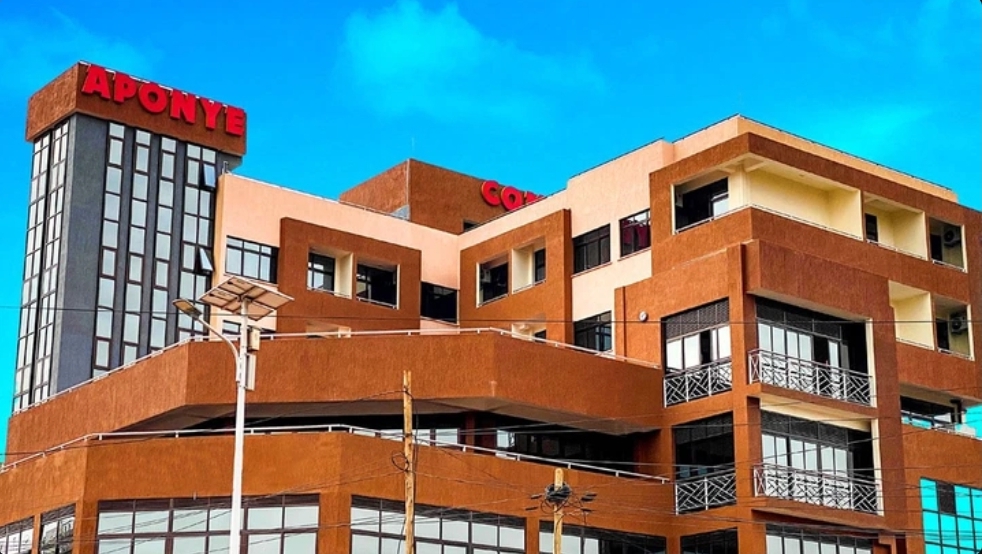The Rise And Fall Of The Aponye Business Empire: From Agro Giant To Debt Distress

For decades, the name Aponye stood tall in Uganda’s business circles, synonymous with agro-processing success, expansive real estate investments, and strategic government supply contracts.
Founded by the late Apollo Nyegamehe, commonly known as Aponye, the company grew into one of the country’s most visible and respected indigenous business empires.
From humble beginnings in rural Uganda, Nyegamehe built Aponye Uganda Limited into a powerhouse — supplying food to government institutions, investing in logistics infrastructure across districts, and venturing into commercial real estate.
His story embodied the Ugandan entrepreneurial dream: a self-made man who conquered the agribusiness frontier and diversified into other sectors with apparent ease.
But less than two years after Nyegamehe’s sudden death in a tragic road crash on July 6, 2023, the legacy he built now teeters on the brink of collapse.
Behind the impressive warehouses, logistics hubs, and prime real estate holdings is a mountain of debt threatening to sweep away what’s left of the empire.
The Turning Point: Leadership Vacuum After Death
Apollo Nyegamehe’s passing marked a turning point in the trajectory of the business. As the central figure and sole visionary, his absence exposed structural weaknesses in governance and succession planning.
Without strong institutional systems or a well-prepared leadership transition plan, the vast network of companies he founded struggled to maintain momentum.
While his widow, Vangi Nyegamehe, and other family members tried to pick up the pieces, the challenge proved monumental.
By April 2025 — just 22 months after his passing — the company was overwhelmed by financial distress, prompting Vangi to write directly to President Yoweri Museveni, pleading for state intervention.
In her April 3 letter, she painted a grim picture of debt strangling the company’s operations and threatening to wipe out one of Uganda’s most successful agro-based enterprises.
The plea seemed to resonate with the President, who responded on April 28, directing the Prime Minister to coordinate with the Ministries of Finance and Science Innovation to explore a rescue plan.
A Mountain of Debt and Legal Pressure
Despite the presidential directive, the situation remains precarious. Aponye Uganda Limited reportedly owes more than Shs38 billion to various financial institutions, including Uganda Development Bank (UDB), dfcu Bank, and Equity Bank.
The company has allegedly failed to service these loans for over a year, prompting creditors to initiate foreclosure processes.
Last week, law firms AF Mpanga and Cristal Advocates published a public notice warning that unless the company clears its debts within 30 days, mortgaged properties across the country will be sold through auction or private treaty.
The notice signaled that the lenders had lost patience and were prepared to liquidate assets to recover outstanding balances.
Prime Assets Under Threat
Among the properties listed in the foreclosure notice are some of the company’s most strategic holdings:
- A 2.4-hectare agro-processing and logistics hub in Masaka, complete with silos, administrative offices, and worker housing.
- A prime commercial plot measuring nearly one hectare in Makindye, Kampala.
- A developed plot in Nalukolongo with storied offices and a warehouse.
- A sprawling maize processing complex in Wankulukuku, including a control room, manager’s office, and staff quarters.
- A commercial estate in Mubende District and other properties under Quality Polybags, an associated firm.
These facilities once symbolized Aponye’s operational strength — his ability to bridge Uganda’s agricultural value chain from farm to market.
Now, they are listed as collateral for debts that may be impossible to repay without external help.
Government Involvement: A Lifeline or Delay?
President Museveni’s directive offered a glimmer of hope, but government officials have remained largely non-committal.
Attorney General Kiryowa Kiwanuka confirmed that the Finance Ministry was reviewing the matter.
However, a source within the Ministry described the President’s instructions as “not clear,” raising doubts about the urgency and clarity of the proposed intervention.
Trade Minister Francis Mwebesa acknowledged receipt of the directive but passed the matter on to “relevant people,” while Finance Minister Matia Kasaija and Treasury Secretary Ramathan Ggoobi remained silent as the auction deadline looms.
It’s unclear whether the government intends to clear its arrears owed to Aponye — the company is among the largest suppliers to security institutions — or offer some form of equity injection. Either way, time is running out.
A Legacy in Limbo
Apollo Nyegamehe’s business acumen was indisputable, but his sudden death exposed the fragility of a company built too tightly around a single man.
His empire lacked the corporate governance infrastructure necessary for continuity. Without clear leadership, the family has been left scrambling to navigate complex financial terrain, often behind closed doors and under mounting pressure.
The collapse of Aponye Uganda Limited would not only mark the end of a once-great business empire but also serve as a cautionary tale for Ugandan entrepreneurs — one that underscores the importance of debt management, corporate succession planning, and institutional governance.
Unless swift and decisive action is taken — by creditors, government, or both — the fall of the Aponye empire may become one of the most dramatic business downfalls in recent Ugandan history.



0 Comments